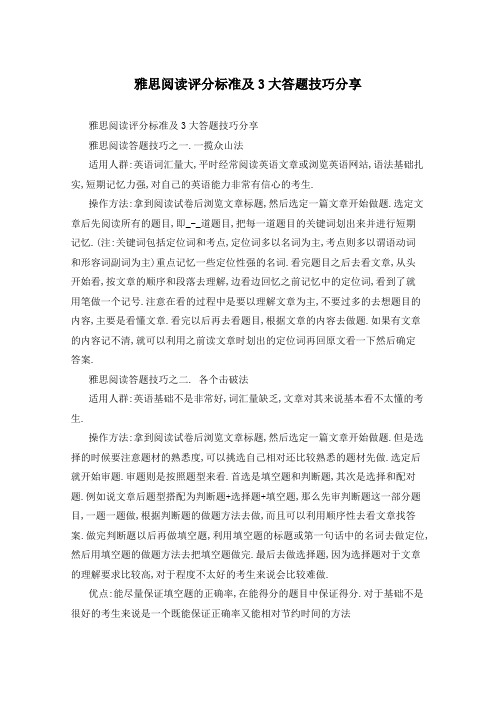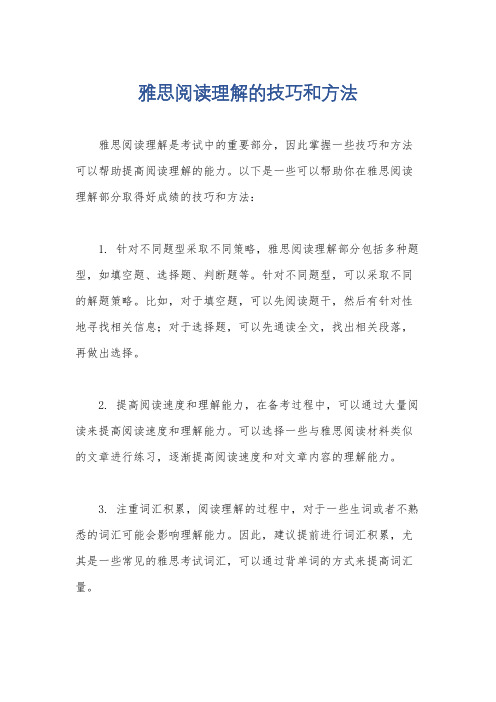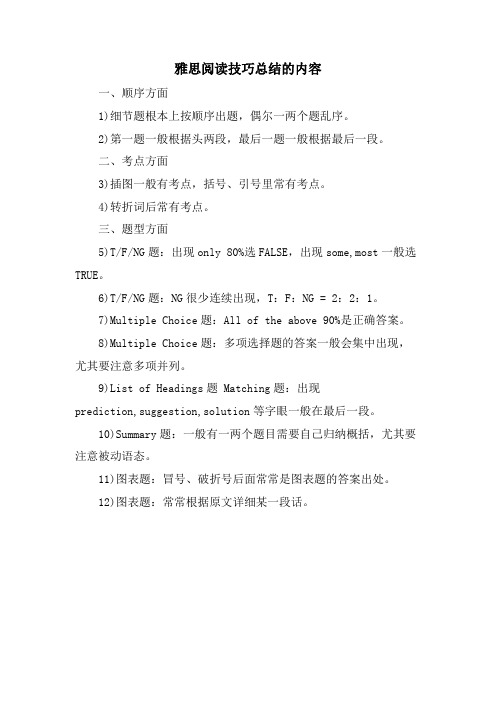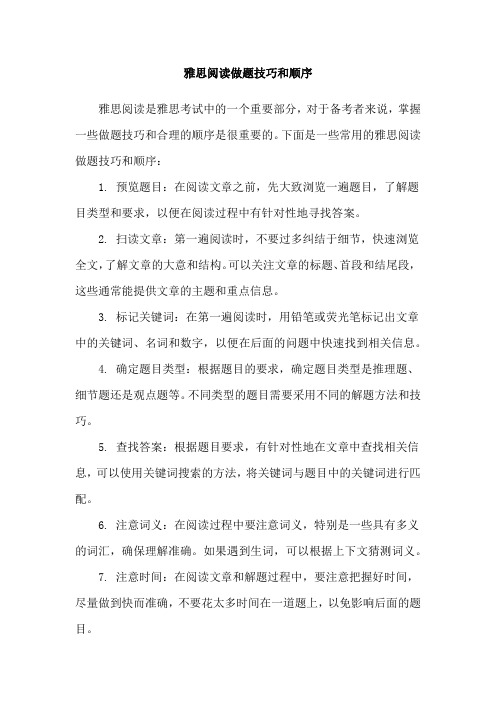雅思学术类阅读解题法则及攻略
雅思阅读评分标准及3大答题技巧分享

雅思阅读评分标准及3大答题技巧分享雅思阅读评分标准及3大答题技巧分享雅思阅读答题技巧之一.一揽众山法适用人群:英语词汇量大,平时经常阅读英语文章或浏览英语网站,语法基础扎实,短期记忆力强,对自己的英语能力非常有信心的考生.操作方法:拿到阅读试卷后浏览文章标题,然后选定一篇文章开始做题.选定文章后先阅读所有的题目,即_-_道题目,把每一道题目的关键词划出来并进行短期记忆.(注:关键词包括定位词和考点,定位词多以名词为主,考点则多以谓语动词和形容词副词为主)重点记忆一些定位性强的名词.看完题目之后去看文章,从头开始看,按文章的顺序和段落去理解,边看边回忆之前记忆中的定位词,看到了就用笔做一个记号.注意在看的过程中是要以理解文章为主,不要过多的去想题目的内容,主要是看懂文章.看完以后再去看题目,根据文章的内容去做题.如果有文章的内容记不清,就可以利用之前读文章时划出的定位词再回原文看一下然后确定答案.雅思阅读答题技巧之二. 各个击破法适用人群:英语基础不是非常好,词汇量缺乏,文章对其来说基本看不太懂的考生.操作方法:拿到阅读试卷后浏览文章标题,然后选定一篇文章开始做题.但是选择的时候要注意题材的熟悉度,可以挑选自己相对还比较熟悉的题材先做.选定后就开始审题.审题则是按照题型来看.首选是填空题和判断题,其次是选择和配对题.例如说文章后题型搭配为判断题+选择题+填空题,那么先审判断题这一部分题目,一题一题做,根据判断题的做题方法去做,而且可以利用顺序性去看文章找答案.做完判断题以后再做填空题,利用填空题的标题或第一句话中的名词去做定位,然后用填空题的做题方法去把填空题做完.最后去做选择题,因为选择题对于文章的理解要求比较高,对于程度不太好的考生来说会比较难做.优点:能尽量保证填空题的正确率,在能得分的题目中保证得分.对于基础不是很好的考生来说是一个既能保证正确率又能相对节约时间的方法缺陷:时间花费比较多,而且会多次重复阅读文章.雅思阅读答题技巧之三. 融会贯通法适用人群:有一定的英语词汇量,并参加过培训班,掌握了基础语法知识.操作方法:拿到阅读试卷后浏览文章标题和文章后的题型,选择自己最熟悉的话题或者有自己最擅长的题型的那篇文章.然后浏览一下题型,确定下题型关注的先后顺序,也是先填空判断,后配对选择.但这种先后并不是绝对的,而是交替的,也就是在重点做填空判断之前已经将判断选择的定位词和关键词划出并记忆,然后在做填空判断时顺带着看看有没有出现配对题和选择题的定位词出现.如果程度稍好的同学则可以看一段文章,把这段文章中涉及到的各种题型的题目都完成,一段一段解决问题.但是用这种方法的时候要注意时间的把握.优点:可以相对合理的安排时间去做题,也能保证容易做的题型的正确率.缺陷:需要考生能随机应变,对不同的题型搭配要有合理的时间分配,可能会造成审题或看文章内容的混乱.附雅思阅读听力评分标准镇楼雅思阅读小范围预测文章题目Undergraduate students study dramas重复年份__31 _1_8题材人文社科题型暂无文章大意文学专业学生的课程指南,提到了让学生观看英国不同时期剧院中的戏剧, 并列举了不同时期四种剧院的特点.参考阅读:Medieval periodMain article: Medieval theatreBy the medieval period, the mummers plays had developed, a form of earlystreet theatre associated with the Morris dance, concentrating on themes such asSaint George and the Dragon and Robin Hood. These were folk tales re-telling oldstories, and the actors travelled from town to town performing these for theiraudiences in return for money and hospitality.Renaissance: Elizabethan and Jacobean periodsThe period known as the English Renaissance, appro_imately _00—_60, saw aflowering of the drama and all the arts. The two candidates for the earliestcomedy in English Nicholas Udall s Ralph Roister Doister (c. _52) and theanonymous Gammer Gurton s Needle (c. _66), belong to the _th century. Duringthe reign of Elizabeth I (_58–__) and then James I (__–25), in the late_th and early _th century, a London-centred culture, that was both courtly andpopular, produced great poetry and drama. The English playwrights were intriguedby Italian model: a conspicuous community of Italian actors had settled inLondon. The linguist and le_icographer John Florio (_53–_25), whose father wasItalian, was a royal language tutor at the Court of James I, and a possiblefriend of and influence on William Shakespeare, had brought much of the Italianlanguage and culture to England. He was also the translator of Montaigne intoEnglish. The earliest Elizabethan plays includes Gorboduc (_61) by Sackvilleand Norton and Thomas Kyd s (_58–94) revenge tragedy The Spanish Tragedy(_92), that influenced Shakespeare s Hamlet._th and _th centuriesAphra Behn was the first professional English woman playwright.During the Interregnum _49—_60, English theatres were kept closed by thePuritans for religious and ideological reasons. When the London theatres openedagain with the Restoration of the monarchy in _60, they flourished under thepersonal interest and support of Charles II. Wide and socially mi_ed audienceswere attracted by topical writing and by the introduction of the firstprofessionalactresses (in Shakespeare s time, all female roles had been played by boys).New genres of the Restoration were heroic drama, pathetic drama, and Restorationcomedy. Notable heroic tragedies of this period include John Dryden s All forLove (_77) and Aureng-zebe (_75), and Thomas Otway s Venice Preserved (_82).The Restoration plays that have best retained the interest of producers andaudiences today are the comedies, such as George Etherege s The Man of Mode(_76), William Wycherley s The Country Wife (_76), John Vanbrugh s The Relapse(_96), and William Congreve s The Way of the World (_00). This period saw thefirst professional woman playwright, Aphra Behn, author of many comediesincluding The Rover (_77). Restoration comedy is famous or notorious for itsse_ual e_plicitness, a quality encouraged by Charles II (_60–_85) personallyand by the rakish aristocratic ethos of his court.Victorian eraA change came in the Victorian era with a profusion on the London stage offarces, musical burlesques, e_travaganzas and comic operas that competed withShakespeare productions and serious drama by the likes of James Planché andThomas William Robertson. In _55, the German Reed Entertainments began aprocess of elevating the le vel of (formerly risqué) musical theatre in Britainthat culminated in the famous series of comic operas by Gilbert and Sullivan andwere followed by the _90s with the first Edwardian musical comedies. W. S.Gilbert and Oscar Wilde were leading poets and dramatists of the late Victorianperiod.[_] Wilde s plays, in particular, stand apart from the many nowforgotten plays of Victorian times and have a much closer relationship to thoseof the Edwardian dramatists such as Irishman George Bernard Shaw and NorwegianHenrik Ibsen.文章题目Unique golden te_tile重复年份___ ___题材工业题型小标题 6+人名配对 4+填空 3文章大意蜘蛛丝与纺织品.文章讲述了 golden spider 是如何在体内把Liquid silk转化为 solid silk 的过程,文章中提到了一些科学家针对蜘蛛做的实验,如何提高 capacity.在结尾两段讲述了关于 spider silk的医学应用及市场的积极前景.参考答案:小标题:i e_periment of an old ideaii lifecycle of Madagascar spidersiii advances in te_tile industryiv resources to meet demandsv physical property of spider silkvi scientific analysis spider silkvii work of artviii importance of silk te_tilei_ difficult to raise spider in capacity_. Paragraph A viii_. Paragraph B v_. Paragraph C i__. Paragraph Di_. Paragraph E iv_. Paragraph F vii人名配对 4:A. Simon PeersB. Nicholas GodlleyC. Blackledge20. need tremendous spider to make a small amount of spider silk B _ Scientists want qualities of spider silk for medical use A_ Scientists make progress to manufacture spider silk C23 spider silk materials are be of strength A填空 3:24. grow silk by introduce genetic material into bacteria and animals25. Silk come from liquid protein made in a gland inside of bodies.26. Spider silk spins cause force to make liquid turn to solid silk.文章题目 British Woodlands重复年份 __30 ___题材自然环境题型段落细节配对 7+选词填空 7文章大意讲的是英国森林的演变利用和最后的管理,大致文章脉络是在人类的入侵之前英国的植被覆盖情况,工业革命之后,人们对森林的掠夺从以燃烧原料和建筑材料为目的到了以工业发展为目的,后来人们意识到保护森林的重要, 开始投入人力物力进行保护.部分答案参考:段落细节配对:27 a desc ription of careless working practices that harm woodland F28 details of landscape prior to human intervention B29 arguments against cash rewards H30 a botanical source of evidence for the appearance of primitive woodlandB31 reasons for reduced economic importance of woodland E32 a reason for recent improvements of woodland management G33 an implication for people of unhealthy tree A选词填空:Evolution of British WoodlandWhen woodland started to grow after last Ice Age. certain 34. speciesnaturallydominated certain regions of Britain. People then intervened to reduce thewoodland by using grazing animals and methods such as 35. burning and coppicing.An increasing number of trees have been grown to meet the demand of 36.IndustrySituations of woodland in Britain deteriorated due to the use of 37.I andthe rigid38. planting patterns of woodland. Such practices also destroyed the39.habits Gof animals and other wildlife.However, in the twentieth century, the state of woodland in Britain has beenimproved. 40.grants available for fund encourage people to plant trees in goodquality.雅思阅读小范围预测题目:the nature of yawning内容:关于打哈欠传染的研究题型:段落细节匹配5道+特殊词匹配4道+填空4道题号:___文章大意:讲关于打呵欠传染的研究,主要有三个研究机构开展的研究.第一个机构研究发现打呵欠是人类冷却大脑的一种方式.后面两个研究发现打呵欠和个人的性格.同情心.专业背景有关,和性别无关.最后讲了呵欠产生的过程,提到有一种理论讲的是呵欠可能是人类交流的一种方式,用于提醒同伴你累了需要休息,从而要求对方打起精神应对危险.部分答案回忆:_. C imagining leads to yawning_. D occupation and inclination to yawning_. A overview of research_. B body temperature and yawning_. B disapprove of a theory_. B not difference in gender20. C mental disorder 文中定位:autism_. A the way we breathe 文中定位:inhale_. B trained yawn more than the untrained23. bond用来联系人类情感24 danger危险的时候警示别人rest特别是需要休息的时候non-verbal是人类肢体语言的一种题目:the nature of music内容:对音乐的研究,介绍音乐历史和音乐对人类的影响题型:选择4道+段落信息匹配5道+判断5道参考答案:25. C定位词:第一段中的 nature of music ,答案:many elements26. D 定位词:language and music ,答案:STEVE27. A 定位词:Neanderthals 答案:show reactions28. C定位词:Neanderthals and homo sapiens 答案:for partners31 . D 定位词:feature and music ,答案:change in all cultures32. C 定位词:Mithen ,答案:reference for other people33. A定位词:precious research ,答案:limited in the range of research34. E 定位词:power of emotion ,答案:long history35. B 定位词:reviewer disagrees with Mithen ,答案:modem speech 影响音乐36. TRUE most discussion ignore physical factors37. TRUE shared features/small societies/remote areas38. NOT GIVEN people talk to babies/similar to/Neandethals music39. FALSE Mithen support Steve40. NOT GIVEN modem people depend heavily on electronic music题目:Thomas Young ~The Last True Know一It一All题材:人物传记题型:判断7+填空6参考文章:A Thomas Young(_73一_29)contributed 63 articles to the EncyclopediaBritannica, Including 46 Biographical entries(mostly on scientists andclassicists) and substantial essays on Bridge, Chromatics, Egypt, Languages,and Tides Was someone who could write authoritatively about so many subjects apolymath, a genius or a dilettante? In an ambitious new biography, Andrew Robinson argues that Young is a good contender for the epitaph the lastman whoknew everything〞 Young has competition, however: The phrase, which Robinsontakes for his title, also serves as the subtitle of two other recentbiographies: Leonard Warren s _98 life of paleontologist Joseph Leidy(_23一_91) and Paula Findlen s _ book on Athanasius Kircher (__一_80),another polymath.B Young, of course, did more than write encyclopedia entries . He presentedhid first paper to the Royal Society of London at the age of 2O and was electeda Fellow a week after his 2lst birthday. In the paper, Young e_plained theprocess of accommodation in the human eye一on how the eye focuses properly onobjects at varying distances. Young hypothesized that this was achieved bychanges in the shape of the lens. Young also theorized that light traveled inwaves and he believed that, to account for the ability to see in color, theremust be three receptors in the eye corresponding to the three principal colorsto which the retina could respond: red, green, violet. All these hypotheses weresubsequently proved to be correct.C Later in his life, when he was in his forties, Young was instrumental incracking the code that Unlocked the unknown sc ript on the Rosetta Stone,atablet that was found in Egypt by the Napo leonic army in_99.The stonecontains te_t in three alphabets: Greek, something Unrecognizable and Egyptianhieroglyphs. The unrecognizable sc ript is now known as demotic and, as Youngdeduced, is related directly to hieroglyphic. His initial work on this appearedin his Britannica entry on Egypt. In another entry, he coined the termIndo一European to describe the family of languages spoken throughout most ofEurope and northern India. These are the landmark achievements of a man who wasa child prodigy and who,unlike many remarkable children, did not disappear intooblivion as an adult.D Bom in _73 in Somerset in England, Young lived from an early age with hismaternal Grandfather ,eventually leaving to attend boarding school. He haddevoured books from the age of two, and through his own initiative hee_celledat Latin, Greek, mathematics and natural philosophy. After leaving school , hewas greatly encouraged by his mother s uncle, Richard Brocklesby, a physicianand Fellow of the Royal Society. Following Brocklesby lead, Young decided topursue a career in medicine. He studied in London, following the medicalcircuit, and then moved on to more formal education in Edinburgh, G6ttingen andCambridge. After completing his medical training at the University of Cambridgein __, Young set up practice as a physician in London. He soon became a Fellowof the Royal College of Physicians and a few years later was appointed physicianat St. George’s Hospital.E Young’s skill as a physician, however, did not equal his skill as a scholarof natural philosophy or linguistics. Earlier, in __, he had been appointed toa professorship of natural philosophy at the Royal Institution, where hedelivered as many as 60 lectures in a year. These were published in two volumesin __. In __ Young had become secretary to the Royal Society, a post hewould hold until his death. His opinions were sought on civic and nationalmatters, such as the introduction of gas lighting to London and methods of shipconstruction. From __ he was superintendent of the Nautical Almanac andsecretary to the Board of Longitude. From _24 to _29 he was physician to andinspector of calculations for the Palladian Insurance Company. Between __ and_25 he contributed his many and various entries to the Encyclopedia Britannica,and throughout his career he authored numerous books, essays and papers.F Young is a perfect subject for a biography - perfect, but dauntitianhieroglyphs). Some readers of this book will, like Robinson, find Young’saccomplishments impressive; others will see him as some historians have - as adilettante. Yet despite the rich material presented in this book, readers willnot end up knowing Young personally. We catch glimpses of a playful Young,doodling Greek and Latin phrases in his notes on medical lectures and translating the verses that a young lady had written on the walls of a summerhouse into Greek elegiaes. Young was introduced into elite society,attended the theatre and learned to dance and play the flute. In addition, hewas an accomplished horseman. However, his personal life looks pale ne_t to hisvibrant career and studies.G Young married Eliza Ma_well in __, and according to Robinson, theirmarriage was a happy one and she appreciated his work_ Almost all we know abouther is that she sustained her husband through some rancorous disputes aboutoptics and that she worried about money when his medical career was slow to takeoff. Veiy little evidence survives about the comple_ities of Young5s relationships with his mother and father. Robinson does not credit them,oranyone else, with shaping Young5 s e_traordinary mind. Despite the lack ofdetails concerning Young5 s relationships, however, anyone interested in what itmeans to be a genius should read this book.参考答案:Questions 1-7Do the following statements agree with the information given in ReadingPassage 1 ?In bo_es 1 -7 on your answer sheet, write TRUE if the statement is true FALSEif the statement is falseNOT GIVEN if the information is not given in the passage1 The last man who knew everything’ has also been claimed to other people.True2 All Young articles were published in Encyclopedia Britannica. False3 Like others, Young wasn’t so brilliant when grew up. False4 Young talents as a tor are surpassing his other skills. NG5 Young advice was sought by people responsible for local and nationalissues. True6 Young was interested in various social pastimes. True7 Young suffered from a disease in his later years. NGQuestions 8-_Answer the questions below.Choose NO MORE THAN THREE WORDS AND/OR A NUMBER from the passage for eachanswer.8 How many life stories did Young write for Encyclopedia Britannica?469 What aspect of scientific research did Young do in his first academicpaper? Human eye accommodation10 What name did Young introduce to refer to a group of languages?Indo-European_ Who inspired Young to start the medical studies? Richard Brocklesby _ Where did Young get a teaching position? Royal Institution_ What contribution did Young make to London? Gas lighting 雅思阅读评分标准及3大答题技巧分享。
雅思阅读题目怎么答-选择题技巧-阅读注意事项

雅思阅读题目怎么答-选择题技巧-阅读注意事项雅思阅读答题技巧:1.浏览文章,观察题目题型组合和数量,推断文章类型;2.划出所有题目的定位词,推断题目难易;3.先做好定位的,先易后难;4.随时注意题目之间的联系。
1. 浏览文章,观察题目题型组合和数量,推断文章类型。
拿到文章后,建议考生先不要立马直接做题,而是先观察一下文章里有哪些题型,并且关注一下题目数量,推断是哪一种类型的文章,并且预估考点在文章中的分布状况。
2. 划出所有题目的定位词,推断题目难易。
划定位词肯定是每位考生都会做的,但是很多考生都是定位一题做一题,再去划下一题的定位词。
这种做法既浪费时间,也不能很好地运用到顺序原则,更不能帮助考生快速推断题目定位难度。
所以这种划定位词的做法是不可取的。
很难提升雅思阅读的速度。
事实上,技能不到位。
即使通常擅长〔英语〕的候选人也不应盲目相信雅思阅读只能获得,而不必须要技能辅助。
考生的雅思阅读时间实际上非常紧张,技能可以通过大化时间来节省时间。
考生想要了解雅思阅读评分标准。
以下是雅思阅读答题技巧和学习原理。
阅读题目中的定位词可以分为两种,一种是显然定位词,一种是非显然定位词。
显然定位词主要以特别的、不易被替换的词为主,如大写的人名、地名、数字、带有特别符号的词等等。
这种词很显眼,考生可以在文章中快速找到。
与之相对的是非显然定位词,主要是比较不特别的,容易被替换的词。
这种词由于本身既没有被大写,又是一般的名词、动词或形容词,所以很容易被替换,所以考生会比较难定位。
所以,建议考生先划出所有题目的定位词,推断各题目定位难度后,才干更好地利用顺序原则确定大致出题范围。
3. 先做好定位的,容易解答的;再做难定位的,难解答的。
在观察完题型,划出所有题目定位词后,考生会对各题型和题目难度做大致推断。
建议考生先去做容易定位到,和难度较小的题目,再去做比较难找,或者难解答的题目。
这样才可以在基础题上快速得分,计划证正确率,避免在难题上浪费太多时间。
雅思阅读理解的技巧和方法

雅思阅读理解的技巧和方法
雅思阅读理解是考试中的重要部分,因此掌握一些技巧和方法可以帮助提高阅读理解的能力。
以下是一些可以帮助你在雅思阅读理解部分取得好成绩的技巧和方法:
1. 针对不同题型采取不同策略,雅思阅读理解部分包括多种题型,如填空题、选择题、判断题等。
针对不同题型,可以采取不同的解题策略。
比如,对于填空题,可以先阅读题干,然后有针对性地寻找相关信息;对于选择题,可以先通读全文,找出相关段落,再做出选择。
2. 提高阅读速度和理解能力,在备考过程中,可以通过大量阅读来提高阅读速度和理解能力。
可以选择一些与雅思阅读材料类似的文章进行练习,逐渐提高阅读速度和对文章内容的理解能力。
3. 注重词汇积累,阅读理解的过程中,对于一些生词或者不熟悉的词汇可能会影响理解能力。
因此,建议提前进行词汇积累,尤其是一些常见的雅思考试词汇,可以通过背单词的方式来提高词汇量。
4. 注意文章结构和逻辑关系,在阅读文章时,要注意文章的结构和逻辑关系,抓住文章的主题和要点,这样有助于更好地理解文章内容,从而更准确地回答问题。
5. 刻意练习和模拟考试,在备考过程中,可以通过大量的刻意练习和模拟考试来提高阅读理解能力。
可以选择一些真题或者模拟题进行练习,逐渐熟悉考试的题型和要求,提高应试能力。
总的来说,雅思阅读理解的技巧和方法包括针对不同题型采取不同策略、提高阅读速度和理解能力、注重词汇积累、注意文章结构和逻辑关系以及进行刻意练习和模拟考试。
通过不断的练习和积累,相信大家可以在雅思阅读理解部分取得更好的成绩。
祝你顺利通过雅思考试!。
雅思阅读技巧总结的内容

雅思阅读技巧总结的内容
一、顺序方面
1)细节题根本上按顺序出题,偶尔一两个题乱序。
2)第一题一般根据头两段,最后一题一般根据最后一段。
二、考点方面
3)插图一般有考点,括号、引号里常有考点。
4)转折词后常有考点。
三、题型方面
5)T/F/NG题:出现only 80%选FALSE,出现some,most一般选TRUE。
6)T/F/NG题:NG很少连续出现,T:F:NG = 2:2:1。
7)Multiple Choice题:All of the above 90%是正确答案。
8)Multiple Choice题:多项选择题的答案一般会集中出现,尤其要注意多项并列。
9)List of Headings题 Matching题:出现
prediction,suggestion,solution等字眼一般在最后一段。
10)Summary题:一般有一两个题目需要自己归纳概括,尤其要注意被动语态。
11)图表题:冒号、破折号后面常常是图表题的答案出处。
12)图表题:常常根据原文详细某一段话。
雅思阅读做题技巧和顺序

雅思阅读做题技巧和顺序
雅思阅读是雅思考试中的一个重要部分,对于备考者来说,掌握一些做题技巧和合理的顺序是很重要的。
下面是一些常用的雅思阅读做题技巧和顺序:
1. 预览题目:在阅读文章之前,先大致浏览一遍题目,了解题目类型和要求,以便在阅读过程中有针对性地寻找答案。
2. 扫读文章:第一遍阅读时,不要过多纠结于细节,快速浏览全文,了解文章的大意和结构。
可以关注文章的标题、首段和结尾段,这些通常能提供文章的主题和重点信息。
3. 标记关键词:在第一遍阅读时,用铅笔或荧光笔标记出文章中的关键词、名词和数字,以便在后面的问题中快速找到相关信息。
4. 确定题目类型:根据题目的要求,确定题目类型是推理题、细节题还是观点题等。
不同类型的题目需要采用不同的解题方法和技巧。
5. 查找答案:根据题目要求,有针对性地在文章中查找相关信息,可以使用关键词搜索的方法,将关键词与题目中的关键词进行匹配。
6. 注意词义:在阅读过程中要注意词义,特别是一些具有多义的词汇,确保理解准确。
如果遇到生词,可以根据上下文猜测词义。
7. 注意时间:在阅读文章和解题过程中,要注意把握好时间,尽量做到快而准确,不要花太多时间在一道题上,以免影响后面的题目。
8. 阅读顺序:一般建议按照题目的顺序来阅读文章和解答问题,这样能够更好地掌握文章的逻辑和结构,提高解题效率。
以上是一些常用的雅思阅读做题技巧和顺序,希望对你的备考有所帮助。
雅思17套第三篇阅读解析

雅思17套第三篇阅读解析
雅思阅读理解第三篇主要考察的是考生的学术阅读能力,通常包括自然科学、社会科学和人文科学等领域的内容。
为了更好地应对这一部分,我们需要掌握一定的解题技巧和策略。
一、解题技巧与策略
1.快速浏览:在开始解答问题之前,先花时间快速浏览文章,了解大致内容和结构,为接下来的问题解答奠定基础。
2.查找关键词:在阅读过程中,注意寻找关键词,这将有助于我们在解答问题时更快地找到相关信息。
3.判断题技巧:对于判断题,要学会通过原文寻找证据支持,而不是凭借主观猜测。
4.完成句子题技巧:在解答完成句子题时,要善于将选项与原文进行比较,找出最符合题意的答案。
5.段落匹配题技巧:在解答段落匹配题时,先看题目,再在原文中寻找相关段落,最后进行匹配。
6.事实细节题技巧:对于事实细节题,要仔细阅读原文,找出与问题相关的信息。
二、文章解析及练习建议
1.针对不同题材的文章,要熟悉其特点,例如自然科学文章通常有明确的实验过程和结论。
2.在练习过程中,要注意培养自己的阅读速度和准确性,同时熟悉各种题
型的解题技巧。
3.分析自己的错误原因,并针对性地进行改进。
4.定期进行模拟测试,以检验自己的学习成果。
总之,要想在雅思阅读理解第三篇取得好成绩,关键是要掌握解题技巧,不断提高自己的阅读能力。
雅思阅读全“True”法

雅思阅读全“True”法一、概述在雅思阅读考试中,全“True”法是一种有效的答题策略。
该方法的核心思想是利用题目和原文中的信息,准确地判断每个题目中的陈述是否与原文内容相符。
通过采用这种方法,考生可以更加准确地完成阅读题目,提高阅读理解能力和分数。
二、全“True”法的步骤1.仔细阅读题目,明确题目要求。
在开始阅读文章之前,先仔细阅读题目,明确题目要求。
这有助于考生了解文章的主题和内容,为后续的阅读和答题做好准备。
2.快速浏览文章,把握文章结构。
在阅读文章之前,快速浏览文章标题、小标题和首尾段落,了解文章的整体结构和内容。
这有助于考生更好地理解文章,为后续的答题提供帮助。
3.仔细阅读题目中的陈述,找出关键词。
对于每个题目中的陈述,考生需要仔细阅读,并找出关键词。
这些关键词通常是与文章内容相关的词汇,能够帮助考生定位答案所在的位置。
4.在文章中寻找与关键词相关的信息。
根据关键词,在文章中寻找与关键词相关的信息。
这些信息通常是答案所在的位置。
考生需要仔细阅读这些信息,并理解其含义。
5.比较题目中的陈述和文章中的信息,判断是否相符。
将题目中的陈述与文章中的信息进行比较,判断是否相符。
如果两者内容一致,则可以判断该陈述为“True”;如果内容不一致,则可以判断该陈述为“False”。
6.根据判断结果,选择正确的答案。
根据判断结果,选择正确的答案。
如果陈述为“True”,则选择“TRUE”作为答案;如果陈述为“False”,则选择“FALSE”作为答案。
三、注意事项1.准确理解题目和文章内容。
在采用全“True”法时,考生需要准确理解题目和文章内容。
如果对题目或文章的理解有误,可能会影响判断结果的准确性。
因此,考生需要加强自己的词汇和语法知识,提高阅读理解能力。
2.注意细节和关键词的把握。
在阅读文章和题目时,考生需要注意细节和关键词的把握。
这些细节和关键词是定位答案的重要线索,能够帮助考生更准确地判断陈述是否与文章内容相符。
雅思考试阅读理解基本技巧(一篇)

雅思考试阅读理解基本技巧(一篇)雅思考试阅读理解基本技巧 1首先,针对阅读的Heading题,先略读文章的段落是很重要的。
因为这样能快速获取文章的大意,而且有的文章有小标题的,也可以通过各段的主题句来获取段落的大意。
对于选段落标题的题目,我们最不应该的就是先看选项了,因为选项往往会出现多余的题目,而且有的很相近,等考生看完也不能分清什么。
然后再去看文章段落。
回来再看选项就会发现,把刚刚看的东西都忘记了。
略读技巧的一个突出应用,属于对于各段内容的略读。
除此之外,雅思阅读考试当中还有一种选择全文大意的选择题。
这样的选择题要求考生为全文选择一个合适的标题,需要的是考生对于全文略读的能力。
除去直接应用于题型之外,其实在雅思阅读考试中,略读这一技能是贯穿在每一篇文章当中的。
在进行每篇文章的答题之前,考生都需要通过这个方法来对于文章的大致结构及各段的'内容有个基本的了解。
再次,就是扫读在雅思阅读中的重要性了。
扫读是对细节信息的定位过程。
它的目的是快速找到文章的出题点。
这种方法在考试中尤其重要。
建议考生先要看雅思题目中的题干,找出关键词(通常都是名词,动词和形容词),然后再回到原文中找相应的位置,扫读通常都一目三四行,要求考生有一定的词汇量,因为有些关键词,在题干中是一个词,而在文章中却被替换掉了,如果被替换的单词考生不认识的话,就很难在扫读过程中找到出题点。
从而找到正确答案就更困难了。
我们从题干入手找题目中的定位词,忽略与题目要求不相关的信息,然后回到原文迅速找到定位词所在的地方,即答案可能出现的地方。
最合适的定位词最好是形式稳定且比较容易被扫到。
比如说,雅思阅读定位词有人名、地名、机构名称等,还有数词、特殊印刷字体的词,建议考生遇到这些词的时候一定要用笔把它们画出来,这样在做题的时候找定位词就容易多了。
掌握了上面两种方法之后,就要看考生的词汇量和语法的掌握程度了。
因为雅思阅读是精读和泛读相结合的。
- 1、下载文档前请自行甄别文档内容的完整性,平台不提供额外的编辑、内容补充、找答案等附加服务。
- 2、"仅部分预览"的文档,不可在线预览部分如存在完整性等问题,可反馈申请退款(可完整预览的文档不适用该条件!)。
- 3、如文档侵犯您的权益,请联系客服反馈,我们会尽快为您处理(人工客服工作时间:9:00-18:30)。
雅思学术类阅读解题法则及攻略2017雅思学术类阅读解题法则及攻略
STEPONE:分析文章后的题目
拿到一篇阅读文章,考生应该首先细读题目要求,确定哪些是
关于文章结构的题目,哪些是关于文章细节的题目,同时找出题目
中的中心词。
STEPTWO:带着问题扫描文章
1.扫描标题
考生拿到一篇雅思学术类阅读文章,首先应该看一下文章的标题,而迄今为止,雅思学术类阅读理解考试中大致出现过下列三种题目
类型:第一种是正规标题,始可用来判断文章大意、类型、而得知
文章结构;第二种是主标题加副标题,副标题有时承担揭示文章结构的.重任;第三种是无标题,这种考试形式自99年开在中国考区出现,一般文章较长而且难,但仍然可以在文章第一段发现揭示文章主题
的主旨句。
考生应注意:描述性标题应该予以忽略;如果文章分几个SECTION论述,则SECTION的标题也应该加以注意
2.扫描全文的分段情况及其他信息
考生应注意数字、百分比、分数、时间或货币符号出现较多的段落;引号、大写专有名词、括号及破折号出现较多的段落;斜体字、
黑体字、下划线出现较多的段落
3.扫描每个段落的首末句,把握文章主题:
主题句提示文章每段的主题含意,进而合成整个文章的大意。
因此,一定要找出主题句,从而找出这一段的主题。
主题句通常是一
段文章的首句(当然并非永远如此),寻找主题句的方法可按下列顺序:
首句--→第二句--→中间句--→末句
注意:如果首句是描述性语句则应该予以忽略,通过段落首末句判断段落主题的关键是找准中心词(KEYWORD)中心词最可能是表示主要概念的名词,一般是句子的主语和宾语;表明状态的动词;表示程度高低、范围大小、肯定或否定的副词;中心词会在题目及原文中以同义词形式大量出现。
比如:famous-
prestigious;restructuredelayer.
4.扫描连接上下文的信号词
5.扫描文章文章中是否有图表或示意图
这些图表一般包含了一些有关回答问题的信息,因此可以先对这些图表做一扫描,了解其内容从而加快答题速度,不然的话,就可能陷在文章中四处找寻答案而乱无头绪。
但应注意,一般照片、地图、漫画可以予以忽略。
STEPTHREE:
以问题为中心,通过上述扫描工作,找出文章中对应的中心词,从而定位正确答案。
